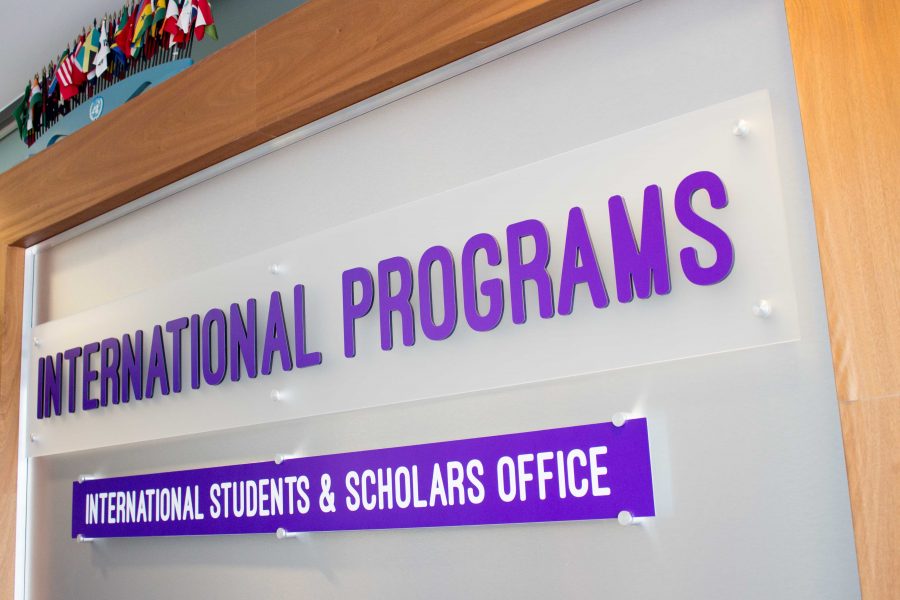Finding food for intl. students
The International Students and Scholars Office and the Department of Residence have both discussed the challenge of accommodating international students on campus, especially during breaks.
Apr 17, 2017
For some UNI international students, finding food during breaks can prove to be a difficult task. Closed dining centers, inadequate kitchen facilities in the dorms and dietary restrictions force some students to pay out of pocket for meals.
Sulaiman Alhudaifi, a UNI student from Oman, said limited food options forced him to eat one meal per day over spring break.
“During the break, I used to walk over to my friend’s apartment to prepare my meals as I did not have enough supplies in my residence hall,” Alhudaifi said. “I have very limited options for eating food [off-campus]due to my religious preferences that only allow me to eat Halal meat. It is very expensive to eat [off-campus] as restaurants that serve halal meat have a costlier menu. The dining centers don’t serve halal meat either but it provides a broader range of food options.”
Halal meat is meat prepared according to specifications outlined in the Quran.
Alhudaifi said his meal plan is satisfactory when he is not on break.
“Thankfully, I had friends who allowed me to cook at their place, I wonder what would have happened to me if I did not have my friends,” Alhudaifi said.
According to Carol Fletcher, the assistant director residential dining, Dining Services Administration and the Department of Residence team up with the International Students and Scholars Office to provide services for international and other students who choose to stay on campus over breaks, but this can be difficult.
“In order to allow for meal plans to cover dining center access over breaks, it would be necessary to increase the overall meal plan cost,” Fletcher said in an email to the Northern Iowan. “Given that the vast majority of students do not remain on campus during breaks, we don’t see that as a fair compromise. It also poses a challenge when there is an open retail venue and no customers.
“Trying to find the balance between services and costs over break periods continues to be a challenge.”
As it stands now, two DOR retail dining options, Biscotti’s and 23rd Street Market, are open during breaks.
This decision, Fletcher said, came from a survey of international students conducted four years ago. For this survey, DOR teamed up with the ISSO director at the time.
“From the survey, most [international students] indicated that they traveled or had friends they visited and were not staying on campus during break periods,” Fletcher said in an email to the NI. “The few that were staying on campus were not interested in ‘guaranteeing’ they would eat specific meals they signed up for or pay additional to get meals from the dining center. There also wasn’t interest in pre-made take-out meals.”
Fletcher said students surveyed indicated they would use their Dining Dollars during break.
“We did have students come to our retail operations over break, however our numbers were low (sometimes as few as two for the entire day),” Fletcher said in an email to the NI.
Mustafa Ali, a sophomore chemistry major, is from Pakistan. Ali said he was unaware that the dining centers would be closed during break nor had any information about alternative places to eat during the break. As a result, he had to stay with his friends during breaks who knew how to cook.
“It is expensive to eat outside compared to cooking at home. I would prefer healthier food and you can easily get good fresh produce from any grocery store,” Ali said. “I don’t have a vehicle and asked my friends to give me a ride to buy food or groceries.”
There are currently more than 500 international students on campus at UNI, but it is difficult to determine how many would prefer the dining centers to be open during breaks.
Fletcher said she met with Felix Weigel, graduate assistant for International Services in October of 2016 for details on students who wished to stay on campus during breaks. According to Fletcher, Weigel determined that, of the students he met with, most indicated they would be traveling during break.
Weigel said he met with student leaders from the Global Panther Success Program, a group of domestic and international students who are tapped into student life through their various engagements on campus.
“They serve in our office to help new international students transition to life at UNI, but we also run other questions, such as break dining needs/options, by them as needed,” Weigel said in an email to the NI. “I did not email all international students who have a meal plan.”
Isabella Varela, associate director of ISSO, said more could be done to gather information on students beyond relying on students from the Global Panther Success Program.
“I believe when we try to reach students and provide information we should also have more ways to connect to students,” Varela said. “I can’t be sure whether the student leaders Felix met with represented majority of the student population staying over break. There are slightly more than five hundred international students on campus and we certainly need more ways to communicate with them.”
Fletcher said she wasn’t disappointed with Weigel’s approach, but there is room to gather better information on student needs during breaks.
According to Fletcher, Weigel’s approach stemmed from a busy transitional period.
“I had initially started a conversation with then Associate Director of ISSO, Genevive Beecher. Genevive was leaving UNI and with her transitioning out Felix got in the tail-end of that,” Fletcher said. “I’m not disappointed with how Felix got his information as I was aware about the director of ISSO leaving there was a lot on his plate. But I do believe in the future, we need to conduct a survey which is encompassing about student plans over break.”









